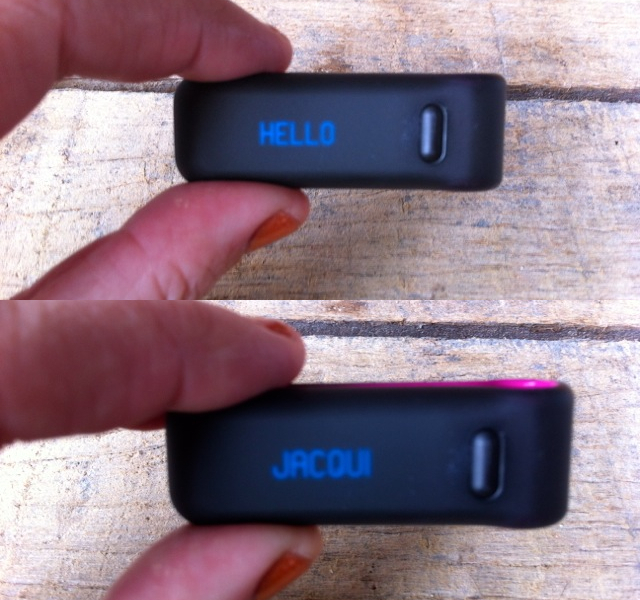
I am a fitness gadget freak. I'm into anything that will help me track, optimize, and analyze my activity stats—that's why I reviewed the Withings Wi-Fi scale and the BodyMedia FIT, and I'm a regular user of RunKeeper, Nike+, and a plethora of other data-driven fitness apps. But rarely do these gadgets and apps actually inspire me to try and beat my previous stats; usually I just use them to track my already planned activity so that I can adjust my own expectations.
This is not the case with the fitbit—or in my case, the fitbit ultra. Given to me as a gift this last January, the "ultra" version of the fitness tracker has been on the market since October of 2011. The most basic element of the fitbit ultra is that it tracks your steps like a pedometer, but it can do a handful of other things: track the number of floors you've climbed, measure your sleep activity, and even display motivational phrases. (Don't laugh—I thought it was campy, too, until my fitbit kept greeting me every day with phrases like "VAMOS JACQUI.") The device can sync your data wirelessly through a USB dock plugged into your computer, so you only have to take it off to charge the battery maybe once a week or so.
Here's where things get personal. As someone who works from home, it's sometimes easy to delude myself into thinking I'm getting the same level of everyday, non-exercise activity as everyone else. But it's not true at all; people who commute to work (whether by foot, bike, public transit, or even car) do end up taking more steps in a day than someone who doesn't have to commute. Walking to and from your car or the subway, walking around your office, going with coworkers to lunch, etc.—all these things add up, and these are things that (generally speaking) a telecommuter doesn't do nearly as often. And those steps you're missing out on can add up.
I always knew this in the back of my head, but my fitbit ultra made this painful fact quite obvious. Because fitbit's website allows you to be friends with other fitbit users and see their stats, I quickly learned that seemingly everyone else on earth takes more steps on an average day than me unless I made explicit efforts to go out of my way to walk more. Many of my nondriving friends here in Chicago tend to take an average of 8,000 to 12,000 steps in a day (as of this writing, my top friend takes an average of 13,000 steps in a day!), and even my driving friends in other cities still seem to take between 6,000 and 8,000. When I began looking at my step stats via the fitbit ultra, I discovered that an average workday for me usually involved between 1,500 and 3,000 steps. On a day when I work and then run several miles, I might make it up to an exciting 5,000. Clearly, the whole working-from-home thing is keeping me quite sedentary even when you add in my running schedule.
That must be the point, then, of the fitbit website's leaderboards and badges: to motivate you to do more and top your friends. And although I'm well aware that I don't need a $99 gadget in order to force myself to take more steps, I must admit that the device and its accompanying website does work for me. Seeing all my friends constantly top me in steps has motivated me to make an extra effort to leave the house more and walk to more places. Things that I wouldn't normally do if I didn't have a number constantly being thrown in my face to show how few steps I've taken that day. On my non-running days, I now take very long walks too. And it's all to juice my own stats.
Now, anytime I set out to go somewhere, my mindset is, "this will definitely rack up the steps on the fitbit." If I forget my fitbit at home, I curse myself for practically the entire day—after all, the day's steps won't "count!" If I end up having to take my bike instead of walking somewhere, I feel mildly annoyed too. Sure, it's activity, but will it add to my step count? Didn't think so.
In the three months I've had my fitbit ultra, this single piece of motivation has helped me up my daily average to almost 6,500 steps—still much lower than most of my friends, but probably more than double what my daily average was when I first started using it. And aside from forcing me to be more active, this has benefitted me in other ways too: I get out more, get more sun and fresh air, see more real human beings in the flesh, and generally feel like more of a real member of society than the cave-dwelling nerd that I apparently was before. On one recent Friday, I somehow made it up to almost 19,000 steps!
One could argue that a standard pedometer, which can be had for as low as a few dollars from Amazon, could offer me the same level of data. That is indeed true, aesthetics aside. But then how would I easily compare myself against the people I know and use their achievements as motivation for my own? I'm very happy to have received my fitbit ultra, and I hope to never be apart from it again. If only it could charge wirelessly, I'd never have to take it off.
reader comments
57